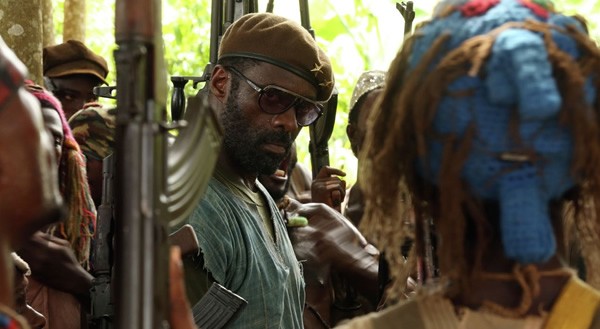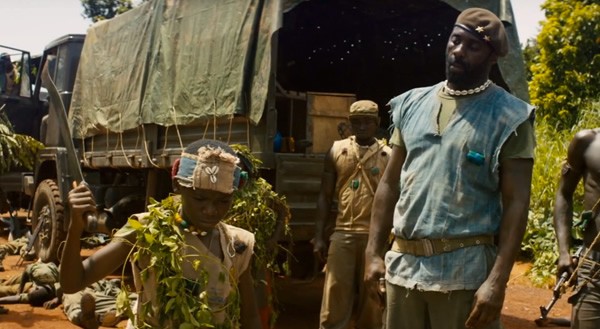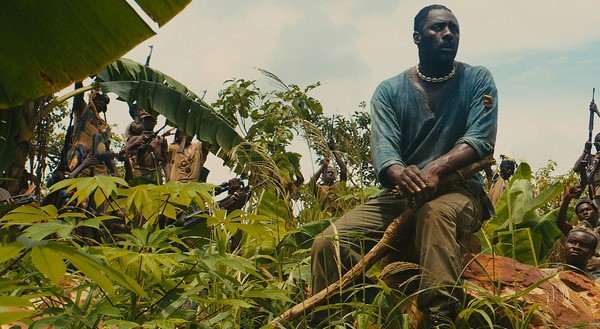
In the jungle
Welcome to the jungle
Watch it bring you to your
nananananananana knees, knees (moah)
I wanna watch you bleed!
Cary Fukunaga’s Beasts of No Nation will probably be remembered as one of the more controversial movies of 2015, but probably not because of its content or its performances.
In a highly debated move, Netflix paid $12 million to release it on the same day as the theatrical release. As the movie was hailed in advance, even assumed to be an Academy Awards contender, theater chains understandably declined to show it. If it’s a success and Netflix tries to make it a regular thing, the traditional months long window between theatrical and home cinema might crumble some more. However, eventually… Fukunaga’s movie might not have been the safest bet to win this rather ugly war. Sure, it has gripping moments, and it is a good movie, but all the way through you feel that it could have been a masterpiece. It’s obviously not, and looking at Fukunaga’s career trajectory one can’t help himself for feeling underwhelmed by that. So much promise, now a notable step back.
Beasts of No Nation tells the story of a young African boy named Agu (Abraham Attah) whose family gets killed by plundering soldiers. Fleeing into the jungle to escape, the lost soul gets picked up by a battalion of a rebel faction. Their godlike leader (Idris Elba) takes the scared boy under his wing and slowly makes him into a ruthless killer.
The whole concept sells itself emotionally already, and that is Fukunaga’s biggest problem. He relies too much on given images. Happiness in poverty. A kid witnessing his family getting slaughtered. Grown-ups talking children into being cold blooded killers. Communities getting torn apart. Torture. Rape. Well, yeah, that is horrible, and as long as you’re not dead inside you will be moved by seeing that, but it’s all up to the director to not just shock us with cruelties and tragedies, but to tell a fascinating story with full arcs for its characters. And this is not one of many projects: having directed one of the best TV seasons of the last five years, and having one of today’s best actors in a leading role comes with a big responsibility to deliver big time.
Disappointingly, Agu’s arc doesn’t deliver fully. During the really strong first half of the movie, it’s highly moving to watch Agu’s loss and how he slowly becomes a soldier. The weaker second half though, in which he slowly begins to question Elba’s leadership, stays too numb. Fukunaga’s directing does have a point: the grown-ups drug the younger ones to numb them down. Makes better killers. Thus Agu becomes rather numb as a mindless drone, and he never really recovers from that. It’s fully believable that a 12-year-old who has shot and killed dozens of victims can’t just go back to being a kid, but having a numb protagonist makes it hard to connect. Then it’s in the hands of the story itself, or in that of other characters.
That could have worked way better if only we knew more about the only other relevant character, the Commandant. The man who guides Agu deeper into hell. At first, the man comes off as a strong, fatherly figure. He offers to help Agu avenge his family as a proud freedom fighter. It doesn’t take long though until he shows his true face. Using the boy’s naivety, he uses a ritual to convince him that the spirits are on their sides. Add drugs, a feeling of power, a new circle of brothers, and a new father to look up to, it’s easy to see how Agu is able to feel home again.
Sadly, the Commandant is a rather one-dimensional antagonist. In a very understated performance, Elba uses his towering size to effect, but both script and directing make his character appear too simple. He’s not really that charismatic to watch, all of his backgrounds, motives and actions are annoyingly unsubtle, and Fukunaga can’t stop making him even more evil. Just when you think that maybe, possibly there’s something tragically interesting behind his eyes, Fukunaga crosses an unnecessary line and just lets you know, nope, he’s just evil. There’s no grey to be found, just easily digestible evil. I won’t spoil stuff from the last act, but all of it kinda stacks up to a cinematic showdown that never comes.
If you had to think about (losely) similar movies, City of God, Blood Diamond, Tsotsi, Elite Squad or Fukunaga’s own Sin Nombre come to mind. While City of God is more refined than the other ones, all of them have more powerful second halves. Not all of them have antagonists as broad as the Commandant, but they are able to keep up the tension, to make more out of the protagonist’s ongoing journey, to feel more complete. Seriously, there’s a moment towards the end in which a character reflects on how he or she has changed, and that scene could already have come after the first half. The second half doesn’t offer much, it just fizzles out.
Technically, it’s a solid production, but it too leans too much on its crutches. The African jungle looks great with its stark colors. War torn camps and towns are tragic ruins, playgrounds for death and despair. There isn’t much art to the presentation though, and while everything is framed nicely and steady, it’s hard not to think about Fukunaga’s own more impressive looking first season of True Detective, or his elegant second feature film, Jane Eyre.
In the end, you’ll probably fare best expecting an interesting movie about an important topic. Just don’t hold the powerful talents of both Elba and Fukunaga against it, because the movie itself won’t end up being important.
Flynn’s Rating: 




Out of a Possible 5 Stars

